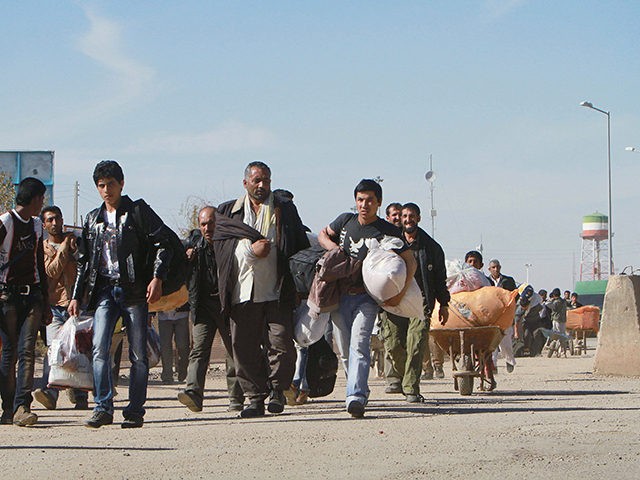A group of 50 to 70 Afghan migrants attempting to cross the border into Iran were allegedly beaten, tortured, and in some cases drowned by Iranian security guards on May 1.
On Wednesday, the Iranian regime officially denied the incident occurred and accused the United States of slandering Tehran by repeating the accusations.
Radio Free Europe (RFE) on Wednesday interviewed a survivor of the incident on the Iranian border, a 28-year-old Afghan named Shah Wali, who said he left his village in northwestern Afghanistan’s Taliban-haunted Faryab province to “escape war and poverty” by seeking “a better life in neighboring Iran.”
Wali and several dozen other Afghans attempted to illegally cross the border, but he said they were intercepted by Iranian border guards who did far worse than turn them back or detain them:
For the next several hours, they were questioned, repeatedly beaten, and then tortured. The guards, he said, then transported the group by bus to the banks of the Harirud, a 1,100-kilometer-long river shared by Afghanistan, Iran, and Turkmenistan.
“After torturing us, Iranian border guards fired their guns and ordered all of us to jump into the river,” Wali told RFE/RL.
“While we were struggling for our lives and drowning in the river, they were laughing,” he said.
The river took them downstream toward Afghanistan.
Wali said he and 11 others swam to safety. He said 23 others drowned. He helped retrieve the bodies of seven of them.
The government of Afghanistan is investigating the incident and has reportedly recovered at least 12 bodies from the area described by Wali, most of them dead from drowning. The Afghan Independent Human Rights Commission (AIHRC) has interviewed survivors who told the same story as Wali, including his account of forced immersion in the Harirud River that killed many of the weary and beaten prisoners.
“Our people, who you put in the river, were not Osama. One day we will settle this,” one Afghan governor said on Twitter, referring to Osama bin Laden and mocking Iran’s tendency to dismiss Afghan refugees as terrorist infiltrators.
The U.S. embassy in Kabul and Acting Assistant Secretary of State for South Asia Alice Wells both acknowledged the AIHRC report, Wells speaking in much more forceful terms:
Iran's cruel treatment and abuse of Afghan migrants alleged in these reports is horrifying. We support calls for a thorough investigation. Those found guilty of such abuse must be held accountable. AGW https://t.co/DQzsGS3twd
— State_SCA (@State_SCA) May 4, 2020
The Iranian government initially claimed to be conducting its own investigation, but on Wednesday the Iranian Foreign Ministry lashed out at Alice Wells and dismissed the alleged human rights violations as a phony story concocted by the U.S. to slander the Iranian regime.
“Iran has strong ties with Afghanistan and leads the way to help Afghan leaders for inclusive government,” the Foreign Ministry claimed. “What happened to Afghan nationals in Herat is tragic and unrelated to Iran, but the U.S. regime’s allegation against Iran is a ‘bitter joke.’”
This would seem to imply Iran believes the murderous border guards were some sort of bandit force that claimed to be working for Iranian border security, or that the Afghan victims were assaulted by some other party and decided to blame the attack on Iran. As of Wednesday morning, the Iranian government has not detailed its alternative theory of the incident, directly accused the survivors of lying about it, or made any claims about who the attackers might have been.
“The regime is a war criminal in Afghanistan and state sponsor of terrorism across the world,” the Iranians thundered, referring to the United States rather than themselves, in accordance with the time-tested I’m Rubber and You’re Glue principle of geopolitical discourse.
Iran’s state-run Tasnim News Agency hastened to back up the Foreign Ministry by noting that “Iran spends eight billion dollars on Afghan migrants every year in various sectors,” and “951,142 Afghan refugees reside in Iran.”
“The U.N. refugee agency has, on numerous occasions, praised Iran for hosting Afghan refugees for more than four decades,” Tasnim said.
Deutsche Welle suggested on Tuesday that Iran might have taken a much harsher stance against Afghan migrants because many of them fled from Iran back into Afghanistan at the height of Iran’s horrific coronavirus outbreak, and the Iranians are worried some will return and bring fresh coronavirus infections with them.

COMMENTS
Please let us know if you're having issues with commenting.